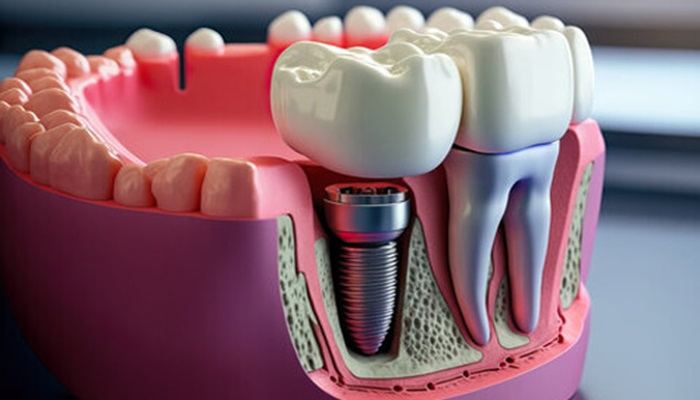Dental implants have become a popular solution for those seeking to replace missing teeth. They offer a permanent and durable option, often preferred over traditional dentures and bridges. In India, the cost of dental implants is significantly lower than in many Western countries, making it an attractive option for both locals and international patients. This article will explore the various factors influencing the cost of dental implants in India, provide a detailed breakdown of prices, and discuss what to expect during the implant process.
What Are Dental Implants?
Dental implants are artificial tooth roots made of biocompatible materials, typically titanium, that are surgically placed into the jawbone. Once the implant integrates with the bone, a crown (the visible part of the tooth) is attached to restore functionality and aesthetics. Implants can replace a single tooth, multiple teeth, or even support full arch restorations.
Average Cost of Dental Implants in India
The cost of dental implants in India varies widely based on several factors, including the type of implant, the materials used, the complexity of the procedure, and the location of the dental clinic. On average, the cost of a single dental implant in India ranges from ₹20,000 to ₹1,50,000 (approximately $250 to $1,800). Here’s a more detailed breakdown:
Titanium Implants: The most common type, costing between ₹40,000 to ₹80,000 per implant.
Zirconium Implants: A more aesthetic option, priced between ₹90,000 to ₹1,50,000 per implant.
All-on-4/All-on-6 Implants: Full arch restorations can range from ₹1,00,000 to ₹3,00,000 depending on the materials and complexity involved.
see also: Why Cancer Patients Should Visit A Dentist Before Starting Chemotherapy
Factors Influencing The Cost of Dental Implants
Several factors can affect the overall cost of dental implants in India:
1. Type of Implant
The type of implant selected plays a significant role in determining the cost. Titanium implants are generally more affordable than zirconium implants due to the material’s properties and manufacturing processes.
2. Number of Implants Needed
The total cost will increase with the number of implants required. For example, replacing a full arch of teeth will be more expensive than a single implant.
3. Location of the Dental Clinic
Prices can vary significantly based on the clinic’s location. Major cities like Delhi, Mumbai, and Bangalore tend to have higher costs due to the demand for advanced dental services and higher operational costs. For instance:
Delhi: ₹45,000 to ₹1,50,000 per implant
Mumbai: ₹20,000 to ₹60,000 per implant
Bangalore: ₹20,000 to ₹50,000 per implant
Chennai: ₹15,000 to ₹45,000 per implant
Kolkata: ₹15,000 to ₹40,000 per implant
4. Surgeon’s Expertise
The experience and qualifications of the dental surgeon can also impact the cost. Highly experienced implantologists may charge more due to their expertise and success rates.
5. Additional Procedures
In some cases, additional procedures such as bone grafting, sinus lifts, or tooth extractions may be necessary before implant placement.
These procedures can add to the overall cost, with bone grafts typically ranging from ₹5,000 to ₹20,000.
The Dental Implant Procedure
Understanding the dental implant procedure can help patients prepare for what to expect and the associated costs.
1. Initial Consultation
The process begins with a consultation where the dentist evaluates the patient’s oral health, discusses treatment options, and creates a personalized treatment plan. Diagnostic imaging, such as X-rays or 3D scans, may be performed to assess bone density and structure.
2. Implant Placement
During the surgical procedure, the implant is placed into the jawbone under local anesthesia. The healing process begins as the bone integrates with the implant, a process known as osseointegration, which can take several months.
3. Abutment Placement
Once the implant has integrated with the bone, a small connector called an abutment is placed on top of the implant. This serves as the base for the crown.
4. Crown Placement
Finally, a custom-made crown is attached to the abutment, completing the restoration. This crown is designed to match the color and shape of the surrounding teeth for a natural appearance.
Advantages of Dental Implants
Dental implants offer several advantages over traditional tooth replacement options:
Durability: With proper care, dental implants can last a lifetime.
Functionality: Implants function like natural teeth, allowing for normal eating and speaking.
Aesthetic Appeal: Implants look and feel like natural teeth, enhancing the smile.
Bone Health: Implants help preserve jawbone density, preventing bone loss that can occur with missing teeth.
Disadvantages of Dental Implants
While dental implants have many benefits, there are also some disadvantages to consider:
Cost: Although more affordable in India than in many countries, implants can still be a significant investment.
Surgical Procedure: The placement of implants requires surgery, which carries inherent risks, including infection and complications.
Time Commitment: The process can take several months, especially if additional procedures are needed.
Conclusion
Dental implants in India provide an effective solution for replacing missing teeth, with costs significantly lower than in many Western countries. Understanding the factors that influence the price of dental implants can help patients make informed decisions about their dental care. While the initial investment may be higher than traditional dentures or bridges, the long-term benefits of dental implants, including durability, functionality, and aesthetic appeal, make them a worthwhile consideration.

